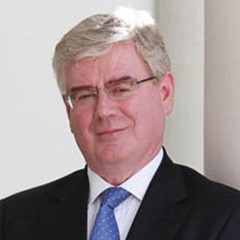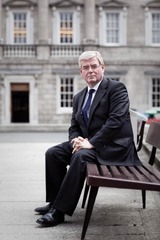Ireland’s way ahead
 An Tánaiste · Eamon Gilmore TD
An Tánaiste · Eamon Gilmore TD
The Irish Minister for Foreign Affairs and Trade answers agendaNi’s questions on the Republic’s prospects after leaving the bail-out and his aims for North/South co-operation and domestic policy.
What more needs to be done to restore Ireland’s reputation?
We have worked hard over the past few years to ensure that the progress made in stabilising our public finances and rebuilding the economy is recognised by our international partners, global media, and potential investors. This has been an important part of the work of my department and our embassy network, as well as that of the Taoiseach and other members of the Government.
And we have seen the result of those efforts. Ireland is now regarded abroad as a country that has taken the hard decisions and delivered on them. As a result, our bond yields are now back to near historic lows and Ireland is also seen as a good place to invest and to do business again.
The fact that Forbes magazine now ranks Ireland as the best country in the world in which to do business is further evidence of how our efforts have yielded positive results. And, crucially, all of this has contributed to job creation, which is the Government’s top priority.
Last year was the best year for a decade in terms of net job creation from foreign direct investment. There are a lot of reasons for this but not least among them is that the executives making these decisions to invest in Ireland hear from us and from their peers that Ireland is doing the right things to ensure a stable, growing economy.
However, we know too well that reputations can be damaged more easily than they can be restored. We need to keep getting it right in terms of our public finances and supporting economic growth. We also need to make sure that this progress continues to be seen and heard by our partners in Europe and around the world, by potential investors, potential customers for our exporting companies, potential tourists and students – and by our diaspora, which is a hugely valuable resource for us in having our story heard around the world.
What do you hope to achieve in the foreign policy review?
If you look back to 1996, when the last review took place, the internet was four years old, the Good Friday Agreement wouldn’t be reached for another two, the EU had fifteen members and the global economy looked very different to today.
The world today is going through major change. Global challenges, such as cyber-security, climate change and growing food challenges, require global solutions. Emerging powers and economies in Asia, Africa and South America offer new opportunities while changing how we engage internationally.
Through our foreign policy, we pursue Ireland’s economic prosperity and promote peace and security at home and in the wider world. We also make a direct contribution to our well-being as a people through our work promoting trade, tourism and investment, by strengthening relations with old partners and new, by engaging as an EU member and by promoting our culture and our values.
This review is about updating our foreign policy so that we can continue to promote our values and interests effectively, in the EU and in a changing world. Essentially, it is about giving Ireland an edge to succeed internationally.
If the UK left the EU, what impact would that have on Ireland?
Ireland is a fully committed member of the EU, and we see our future as an active and constructive contributor in shaping the future of that union of over 500 million people.
I fully respect the debate currently under way in the UK but it is my strong view that a UK detachment from Europe would be bad for Europe, bad for Britain, and bad for Ireland. Our common EU membership has had an important and positive influence on bilateral relations between Ireland and the UK, and it has helped to shape the way we work together across a whole range of key policy areas.
At EU level, we have worked together on shared interests such as the single market and free trade. This relationship would inevitably be forced to change if Britain was no longer a member of the EU. At a time when increasingly closer co-operation is the hallmark of international success, I do not believe it would be in anyone’s interests should our nearest neighbour exit the EU.
 How much of a role has economic diplomacy played in the recovery?
How much of a role has economic diplomacy played in the recovery?
Economic diplomacy has been fundamental to the progress we have made in turning the economy around. This recovery has been export-led and our work in opening new markets for Irish exporters has been central to job creation.
For example, when I visited Turkey earlier last year, I was joined by 24 Irish companies supported by Enterprise Ireland who were able to announce more than €30 million in new business. The Taoiseach’s recent visit to Japan secured the announcement of the reopening of the Japanese market to Irish beef, worth an estimated €12-15 million in new exports and with potential for further expansion.
Last year, our embassies abroad supported 124 high-level visits with a significant economic and trade dimension to 43 countries, and organised many hundreds of other meetings and engagements to promote trade and investment. This work is making a real impact and has helped to get us to a position where 1,200 new jobs a week are being created in the Irish economy.
How high a priority is Northern Ireland for the Irish Government? Do you accept that it was neglected because of the focus on the bail-out?
I’ve stated before that the peace, prosperity and stability of Northern Ireland are – and have always been – of the highest national importance to the Irish Government. And while exiting the EU-IMF programme was a top priority for this Government on taking office in 2011, this in no way took from the importance my Cabinet colleagues and I attach to Northern Ireland.
Recently Sir John Major came to Iveagh House, headquarters of the Department of Foreign Affairs and Trade, to reflect on British Irish relations, 20 years after the Downing Street Declaration. That joint declaration was the culmination of nearly a decade of work by both governments, and was the staging post for further negotiations leading to the Good Friday Agreement. Though devolution has changed the role of the governments since then, the work today remains as vital and challenging as it was 20 years ago.
I think it’s important to remember that devolution created the space necessary for the Northern Ireland Executive and the other institutions to exercise their responsibilities. But the two governments remain as co-guarantors of the Agreement.
The gardaí work together intensely with the PSNI on a daily basis, Irish Government ministers regularly meet their northern counterparts and I – along with many of my colleagues – made frequent trips to Northern Ireland in 2013, not only for talks with political leaders, but to meet with business representatives and community groups, and to encourage them to make their voices heard.
This work continued right up until the end of the year through our support for Dr Richard Haass and Professor Meghan O’Sullivan. I was in Belfast for the final hours of those talks on 30-31 December, and, while I was disappointed that the parties did not manage to reach a final agreement, I believe the important work of Haass and O’Sullivan must be built on in 2014. For my part, I will continue to work with the British Government and to support the Northern Ireland Executive parties in their efforts to resolve the most difficult and contentious issues facing society in Northern Ireland.
Has North/South co-operation stalled? Where do you see increased co-operation taking place?
North/South co-operation has not stalled. In fact, it has probably never been as strong as it is today with ministers meeting regularly. There were some 25 formal meetings of the North/South Ministerial Council in 2013, including two meetings of the Cabinet with the Northern Ireland Executive.
Just some of the co-operation underway includes developing a cancer radiotherapy centre in the North West, child protection issues, joint research on air pollution, road safety, developing and preserving the island’s waterways and marketing the island to the global tourist market. Co-operation is also evolving into new areas with, for example, significant Northern Ireland involvement in this year’s Global Irish Economic Forum.
The primary task of political leaders is to set the right conditions for economic growth and job creation, especially for our young people, and this is something I have regularly discussed with Peter Robinson and Martin McGuinness.
Many vital financial, economic and EU issues affect both North and South and improved cooperation can yield real results. So we have agreed to look at priorities that will help economic recovery, job creation, the best use of public funds and the most effective delivery of services on this island. This will be a major part of our work in 2014 and I want to see solid results from it that will benefit everyone.
In this coming year, what one thing do you want to achieve?
I want the recovery in our economy to take root. In 2013, the pervasive gloom of the previous five years gave way to cautious optimism and hope. The numbers of people at work increased and the economy began to grow again. Over the course of 2014, I want people to begin to feel more secure in their jobs and their homes.
Above all, I want those who are currently out of work or living abroad by dint of necessity to find work or a pathway to work. We came a long way as a country in 2013 – and the road ahead is still fraught with difficulty – but at last we have regained hope and a measure of self-confidence, and we really can’t underestimate the power of that.





